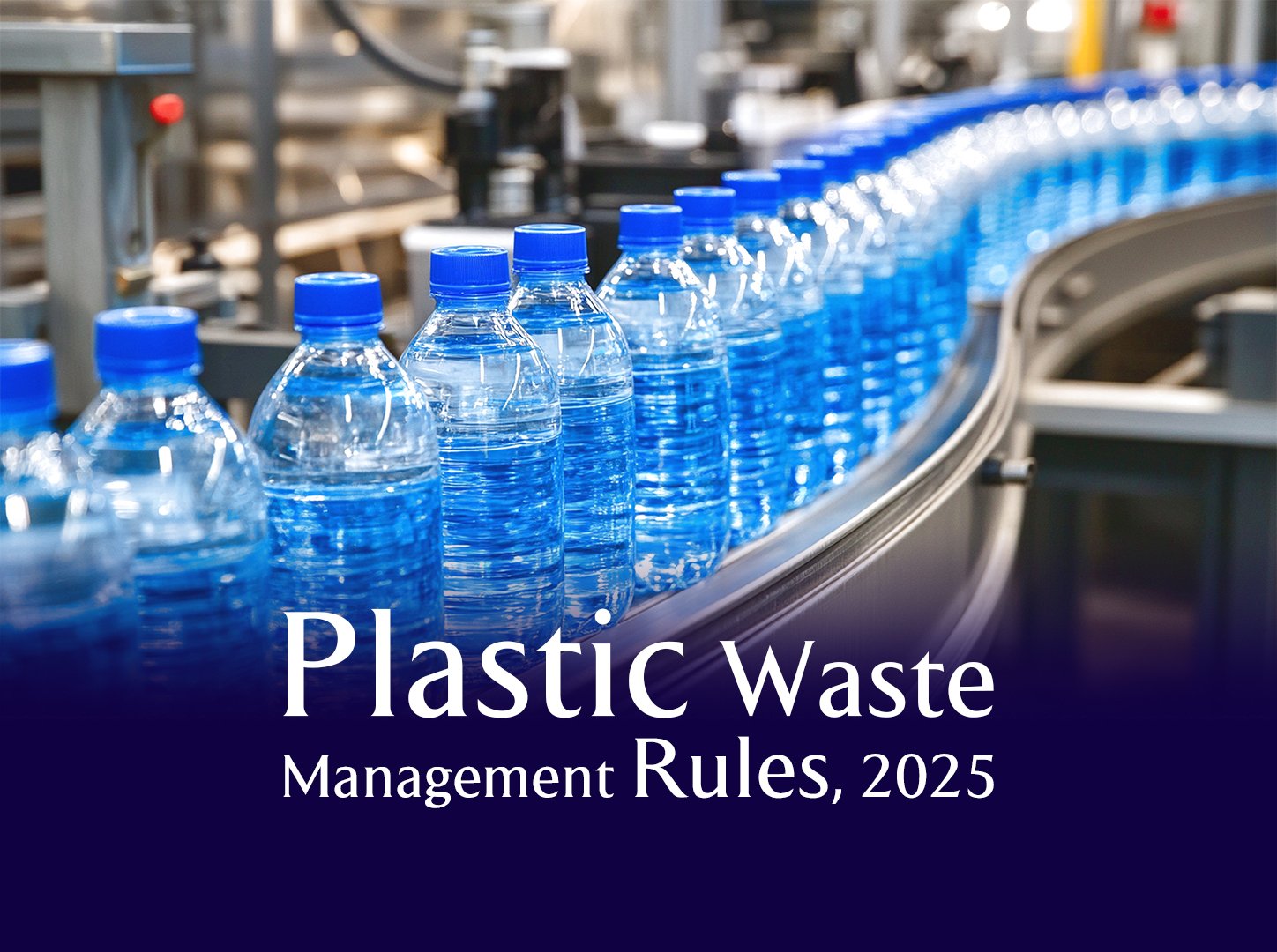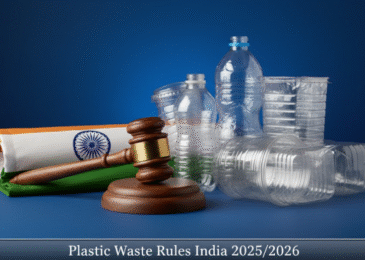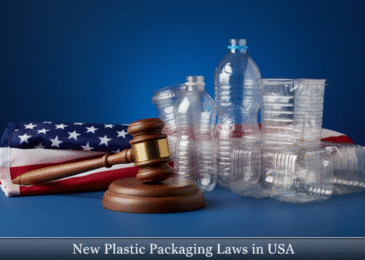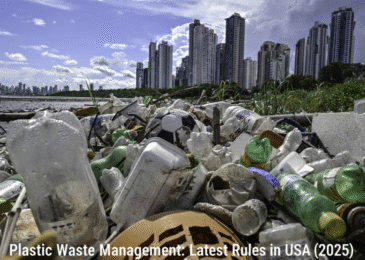Let’s start with a fact that should worry all of us: India generates over 9 million tonnes of plastic waste every year, enough to fill every football stadium in the country, several times over.
But most people have no idea where that plastic ends up, or who is responsible when it pollutes our rivers, soil, or even food chain.
This is way more than just an environmental problem; it’s an economic and social challenge that affects:
- Local businesses
- Farmers and rural communities
- Urban consumers
- Global brands and investors looking at India
That’s why the government has brought in the Plastic Waste Management (Amendment) Rules, 2025, a powerful set of new rules that aim to change how every piece of plastic packaging is made, tracked, and disposed of in India.
This plastic packaging law in India is a turning point that could finally shift India’s plastics economy from a “use and forget” culture to a modern, circular system, where plastics are made responsibly, tracked from start to finish, and put back into the economy rather than polluting the planet.
Whether you’re a manufacturer, a brand owner, a policy maker, or someone building the next generation of packaging solutions, the new rules brought in by the plastic packaging law’s amendment are about to affect you; in my view, for the better.
At Ukhi, we’re directly involved in building traceable, certified biopolymer solutions for packaging, using Indian agricultural waste. Our work is part of the new circular supply chains these rules are trying to accelerate.
That is part of the reason I feel strongly about the need for a strong legal environment that can support a circular economy.
Now, let’s get clear about what these amended plastic packaging rules are, how they work, and what they mean for every part of the value chain.
What Is the New Plastic Packaging Rule in India?
The new rules are laid out by what is officially called the Plastic Waste Management (Amendment) Rules, 2025.
It was published by the Ministry of Environment, Forest and Climate Change (MoEFCC) and applies to every state and every plastic packaging producer in India.
Here’s what you need to know about the latest version of plastic packaging law in India, even if you’re just starting out:
- These rules are mandatory. That means there’s no “opt-out”. if you make, import, sell, or use plastic packaging in India, you’re covered.
- The new requirements have kicked in from July 1, 2025. No phase-in, no loopholes for later compliance.
- The biggest changes are to Rule 11 (which covers what info must be on each package) and the brand-new Rule 19 (which sets out what happens if you break the rules).
The government has published all the details online:
CPCB EPR portal for registration, compliance, and updates
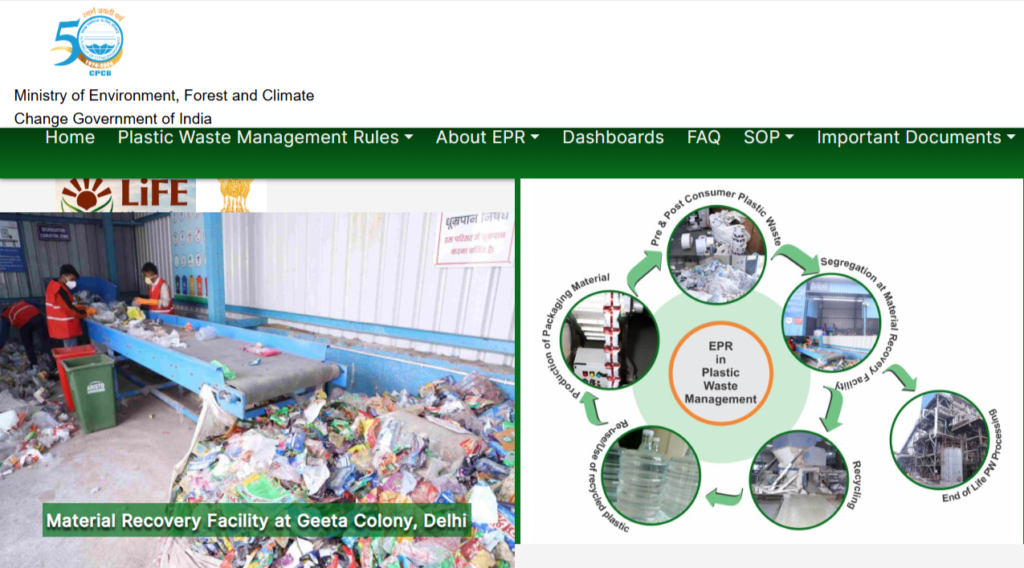
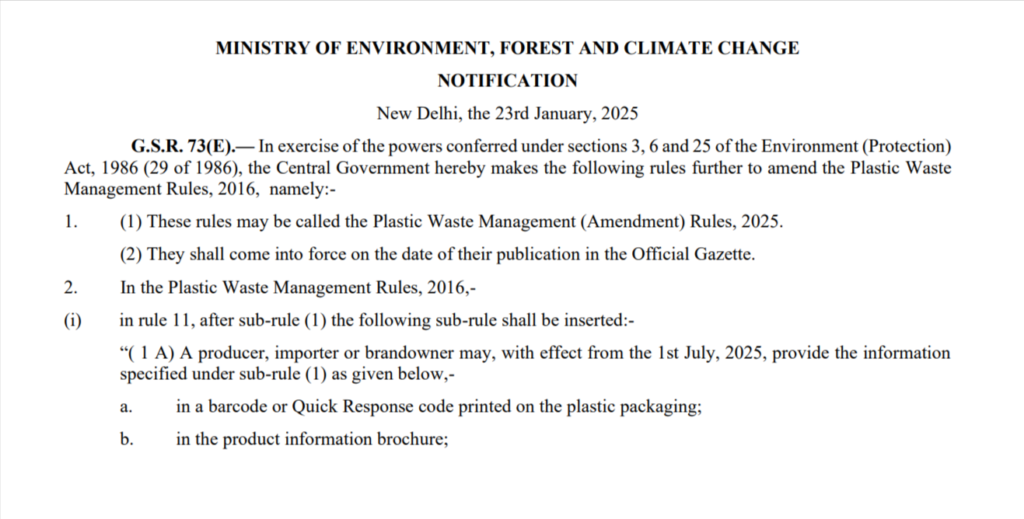
Full legal text of Plastic Waste Management (Amendment) Rules, 2025

If you’re in the plastics business, or planning to invest in sustainable packaging, this law is now the foundation you need to understand.
Let’s move from what the law is, to who actually needs to follow it.
Who Must Comply With Plastic Waste Management (Amendment) Rules, 2025?
If you think this law is only for big plastics manufacturers, think again.
The Plastic Waste Management Rules 2025 are designed to make every link in the plastic packaging chain accountable, not just the factories:
- PIBOs (Producers, Importers, and Brand Owners)
— That means anyone making, importing, or selling plastic packaging or any product in plastic packaging
— Both Indian and international brands operating in India - Manufacturers and recyclers of plastic packaging or raw materials
- Retailers and e-commerce companies who use plastic packaging
If you handle plastic packaging, whether you’re a micro-entrepreneur selling snacks in sachets, or a global food giant, you need to register on the CPCB portal and follow the new labelling, traceability, and EPR rules.
Are there any exemptions?
- There are very limited exemptions, and only for strict technical or statutory reasons (like medical packaging, or food safety integrity).
- These are not automatic. You must apply to the CPCB for any exception, and approval is rare.
In short: if your business touches plastic packaging, the new rules apply to you.
But what exactly are these new requirements? Let’s break down the key provisions that every business, policy maker, and investor should know.
What Are the Key Provisions of the 2025 Rules?
The 2025 amendment is not just about more paperwork. It’s about real, system-level changes that will drive India toward a more responsible and circular plastics economy. Here are the most important changes:
1. Traceability through QR Codes or Barcodes
- From July 1, 2025, every pack—from water bottles to snack wrappers—must have a machine-readable QR code or barcode.
- This code allows regulators (and even consumers) to track a pack through its entire life cycle, making it nearly impossible to hide plastic waste.
2. Registration & Marking
- Every PIBO must register on the CPCB portal and get a unique registration number.
- This reg number, along with manufacturer/importer details and thickness of the packaging, must be printed or coded on the pack.
- The CPCB will publish a public list of compliant brands and update it quarterly, so anyone can check who’s following the law.
3. Extended Producer Responsibility (EPR)
- PIBOs must collect, recycle, or ensure the safe disposal of the same amount of plastic packaging they put into the market.
- Annual EPR targets are tracked via the CPCB portal, with detailed reporting.
- This means companies must have a clear plan for waste collection, recycling, and reporting, or face penalties.
4. Recycled Content Mandates
- Starting 2025, certain packaging types must use a minimum percentage of recycled plastic:
- Rigid packaging: 30% in 2025, ramping up to 60% by 2029
- Flexible: 10–20%
- Multi-layered: 5–10%
- These percentages will push brands to design for recyclability and invest in recycled materials.
Manufacturers of plastic packaging can easily meet these requirements. I know that because as a company, Ukhi is scaling high-quality biopolymers with recycled and compostable content, designed for real-world compliance with IS/BIS/ISO standards which is making it easier for brands and PIBOs to meet both present and future requirements.
5. Certification Standards
- All recycled plastic must meet IS 14534:2023
- Compostable packaging needs to conform to IS/ISO 17088:2021
6. Single-Use Plastic (SUP) Ban
- The ongoing ban on plastics under 50 microns continues, with regular expansion to more categories and stricter enforcement.
Every one of these provisions signals a big shift:
- From anonymous, untracked plastic waste…
- To a system where every pack is traceable, every producer is responsible, and every business is part of the solution.
Next, let’s see how all these requirements play out in the real world, starting with the specifics of labelling and traceability.
What Are the Labelling and Traceability Requirements?
Let’s get practical.
What does a plastic packaging law in India actually require you to print or code on every package? The 2025 rules are about more than just sticking a logo or a green dot on a wrapper.
Here’s what must be present on each pack, starting July 1, 2025:
- A QR code or barcode (machine-readable)
- Or, a clearly printed product information brochure
- Or, a unique identification number issued under another law (so long as it contains all the required details)
What information must these contain?
- The CPCB registration number of the producer, importer, or brand owner (PIBO)
- Manufacturer or importer details
- Thickness of the plastic (critical for carry bags, films, etc.)
- The percentage of recycled content (if any)
- Relevant certification for compostable or biodegradable packaging
Why does this matter?
- It makes every piece of packaging traceable, no matter where it turns up in the country.
- Any regulator or consumer can simply scan a pack and immediately check:
- Is this brand registered and compliant?
- Is the packaging legal (e.g., not a banned single-use plastic)?
- Does the pack use enough recycled content?
- The Central Pollution Control Board (CPCB) will keep a public, quarterly updated list of all PIBOs and their chosen labelling/traceability method.
Technical standards also matter: all these marks, codes, and recycled/compostable claims must conform to the relevant BIS or ISO specifications, ensuring technical rigor and avoiding greenwashing.
This approach shifts the power balance from regulators “chasing” non-compliance, to a world where compliance is instantly checkable, transparent, and public.
Now that we know what needs to be on each package, let’s talk about the consequences if a business ignores these requirements.
What Are the Penalties for Non-Compliance?
Ignoring the Plastic Waste Management Rules 2025 is not an option.
If a business fails to register, mislabels packaging, skips its recycling obligations, or tries to bypass the rules, the consequences are real and significant.
Penalties include:
- Fines: Under Rule 19 (referencing Section 15 of the Environment Protection Act, 1986), fines can reach up to ₹1 lakh, with additional daily penalties if violations continue.
- Imprisonment: For willful or repeat offenses, responsible persons can face up to five years in jail.
- Cancellation of registration: Non-compliant PIBOs risk having their license or CPCB registration revoked, meaning they cannot legally manufacture, import, or sell packaged goods in India.
- Blacklisting: Public naming of defaulters, blacklisting from industry associations, and reputational damage.
- Enforcement examples: In the past year alone, the CPCB and State Pollution Control Boards have issued notices to over 100,000 entities for non-registration or improper labelling. Raids and fines are now routine, especially for illegal SUP manufacturers.
This isn’t about punishing business for the sake of it; it’s about levelling the playing field and making sure no company profits by skipping its environmental responsibilities.
So how do you stay on top of these changing rules and ensure you’re always in compliance? The answer lies in staying connected to the right sources.
Where Can You Find Official Guidelines and Updates?
With the pace of change in India’s plastic packaging regulations, it’s essential to stay plugged into official sources for the latest rules and guidance.
Where should you go?
- The CPCB Plastic Waste Management Portal is your first stop. Here, you can:
- Register your business
- Download guidelines and sample formats
- File compliance returns
- Access lists of compliant PIBOs and quarterly updates
- The CPCB notifications page and the MoEFCC website regularly post:
- New amendments
- Clarifications on technical standards
- Marking and labelling instructions
- Need help? There are helplines and consultant services for onboarding, audit, and ongoing compliance—these are becoming standard as the rules mature.
My advice:
Check for updates at least once a quarter. Regulations can (and do) change quickly as India pushes forward in the fight against plastic pollution.
Frequently Asked Questions
1. What are the new plastic packaging rules in India for 2025?
India now requires all plastic packaging to feature a QR code or barcode for full traceability. Mandatory compliance starts July 1, 2025.
2. What is the minimum recycled content required for plastic packaging in India?
From 2025, rigid packaging must use at least 30% recycled plastic; flexible packaging starts at 10%, with phased increases through 2029 for all major types.
3. Are plastic bags under 60 microns still allowed in India?
No, the law bans single-use plastic bags under 50 microns. Stricter thickness and labelling rules are now enforced nationwide.
4. Who must register under India’s Plastic Waste Management (Amendment) Rules, 2025?
All Producers, Importers, and Brand Owners (PIBOs)including manufacturers, importers, and any brand selling plastic packaging must register on the CPCB EPR portal.
5. What are the penalties for not following the plastic packaging rules in India?
Penalties include large fines, possible jail, and loss of registration for non-compliant companies under Rule 19.


